Can Pet Birds Safely Drink Tap Water? Understanding Risks
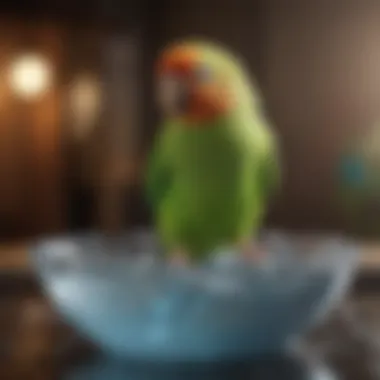
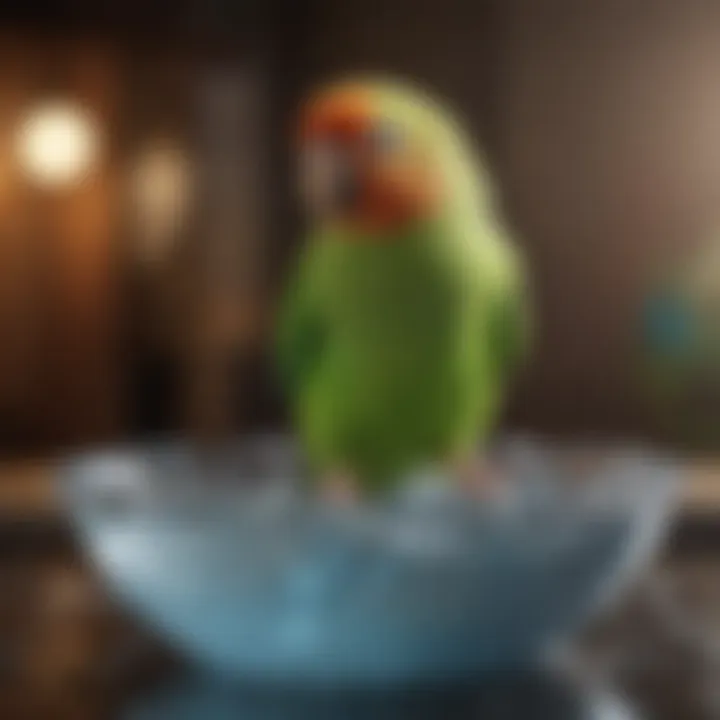
Intro
The issue of tap water for pet birds often sparks spirited debate within the avian care community. While many consider water from the tap to be acceptable, its suitability can depend on several factors. Understanding whether your pet bird can safely drink tap water involves examining critical elements such as water quality, specific dietary needs across different species, and the potential health risks associated with contaminants. For countless bird owners, these concerns are significant, and this guide aims to provide clear, informative advice to support healthy hydration practices for your feathered friends.
Care Tips
Providing the best care to your pet bird goes beyond just food and shelter. It includes ensuring optimal hydration. Here are some essential care tips that can impact your bird’s drinking habits.
Daily Care Routines
Integrated into the daily care of your pet bird should be regular checks of their water supply. Fresh water should be provided at least once a day. If tap water is your chosen option, it is imperative to observe any possible changes in your bird’s behavior post-consumption. Keeping an eye on water levels also aids in better hydration management.
Cage Setup and Maintenance
Positioning the water dish appropriately can affect the bird’s willingness to drink. Ensure it is easily accessible, especially if chronic diseases exist that impact mobility or energy levels. Routine cage maintenance also includes cleaning the water dish regularly, as stale water and accumulated dirt can lead to health risks for your bird.
Hygiene and Cleaning Practices
Cleaning the water dish is vital. Bacteria can grow quickly in standing water, and since birds are prone to health issues, this step cannot be overlooked. Use a safe, bird-friendly disinfectant to clean water vessels weekly. Assess the overall cleanliness of the cage daily as it relates to your bird’s drinking area.
Seasonal Care Adjustments
In warmer conditions, birds tend to drink more. If you offer tap water, consider its quality during the hotter months. Ensure cooler water is always available. Conversely, in the winter, water can sometimes be ignored by birds. Heating systems can dry out the environment, causing dehydration, so monitoring water consumption is essential year-round.
Behavioral Insights
Birds exhibit distinct habits, and interpreting these signs enable owners to cater to their hydration needs better. Understanding bird body language can significantly improve care.
Understanding Bird Body Language
Birds communicate their needs and moods through various body movements and vocalizations. If your bird is frequently dipping its beak into the water, it might be a sign it is thirsty. Conversely, prolonged disinterest in drinking may indicate a problem that warrants prompt attention.
Common Behavioral Issues and Solutions
Sometimes, environmental changes or external stressors can lead to irregular drinking habits. If a bird is suddenly drinking less or seems uninterested in water, identify changes in habitat, such as new pets or alterations to their diet.
Positive Reinforcement Techniques
Utilizing rewards to encourage drinking behavior can be smart. Offer positive reinforcement through treats or verbal cues when your bird drinks. This coping mechanism may reassure your bird and forge a bonding experience.
Social Interaction Needs
Pet birds, being social creatures, thrive on interaction. Sometimes, stressed animals may regress in drinking. Ensuring lively interaction, safety, and companionship can foster normal drinking habits, establishing a routine that makes your bird more comfortable.
Nutrition Guides
While hydration is critical, it often intertwines with the nutritional needs of the bird. Adequate dietary provisions support hydration and overall health.
Essential Diet Components
Ensuring that your bird receives a balanced diet of pellets, fresh fruits, and vegetables will influence how well it hydrates. Consistent access to fresh produce often results in higher fluid intake.
Safe and Toxic Foods
Familiarize yourself with safe foods for your pets. Some common fruits and vegetables are safe, while items like avocados are toxic. Proper nutrition is essential to support a healthy drinking habit.
Supplements and Treats
Certain water-soluble supplements can enhance hydration. Consulting with an avian vet about specific products can ensure you're optimizing your bird's intake and maintaining healthy water consumption.
Feeding Strategies for Different Species
While all birds need water, their consumption metrics varies significantly. Larger species may need more quantity compared to smaller ones, and recognizing these variances is essential.
Wellness and Health
Health check-ups form an authoritative aspect in self-regulating hydration. Regular installations ensure pet birds will benefit from healthy mechanisms whether from tap water or otherwise.
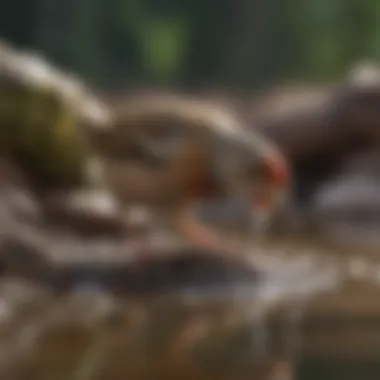
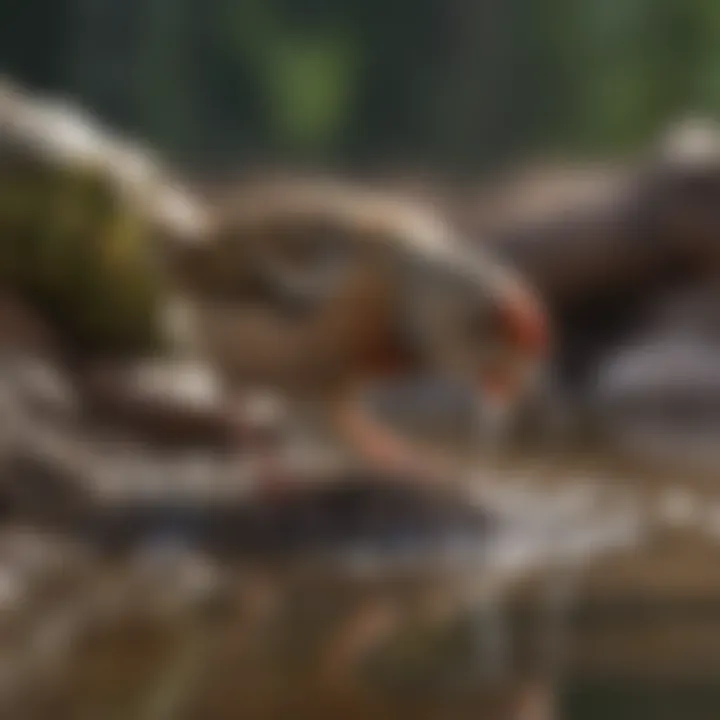
Routine Health Checkups
To ascertain habitual drinking, consistent veterinary check-ups provide an invaluable assessment. The vet can analyze drinking behavior and offer pertinent nutritional recommendations.
Identifying Symptoms of Illness
Keeping an eye out for decreased drinking habits can help catch potential illnesses early. Being observant enables timely prevention and healthcare for your bird.
Preventative Care and Vaccinations
Situation probiotics and distinct water testing can reinforce hydration with minimized risk. Proactive stalls keep you ahead of potential issues to better guarantee that daily hydration streamlines safely into your pet bird’s routine.
Mental and Emotional Well-being
Adequate hydration contributes to the bird’s overall mood. Careful interventions address hydration issues which could, in turn, alleviate stress or anxiety and bolster positive behaviors more magnetically around drinking patterns and associated stressors.
Enriching Activities
Bancing social needs with physical options can enhance birds' experience, made dovetails with special attention to hydration practices.
Toys and Playtime Ideas
Incorporate water play into enrichment sessions with bird-safe, splashing water solutions for engagement within their forms. This can promote natural interest in drinking especially if offered thoughtfully.
Training and Tricks
Training offers routine advantages. Discussion with treats should revolve strategically around trick-training sessions potentially including drink incentives, directing their focus towards healthier practices.
Outdoor Activities and Interaction
Handling outdoor sessions gives you an evident path to assess and embed lockdown or hydration components effectively. Wandering nearby water sources could enhance their urgency to regenerate practicing intake.
DIY Projects for Mental Stimulation
Custom approaches and enrichment projects allow birds to have a range of activities. Introducing hydrating toys within projects invites a fresh perspectives on drinking while also letting their minds explore.
tBased on research, clean, chemical-free water aids in comprehensive avian hydration, overall cell function, and well-being despite possible access route concerns.
By interpreting behaviors and understanding unique needs through the collective guide points, enhancements are physically visible to keeping your bird within safer and adequate continuous hydration.
Understanding the Water Needs of Pet Birds
Understanding the water needs of pet birds is crucial for their health and wellbeing. Much like other domesticated animals, birds rely on fresh water for hydration. Water plays a significant role in digestion, nutrient absorption, and overall metabolic functions. Consequently, pet bird owners must be well-informed about what constitutes adequate hydration.
Basic Hydration Requirements
Birds require a different volume of water depending on factors such as their size, diet, and activity level. Generally, providing access to clean and fresh water daily supports their necessary hydration.
- Smaller birds, like finches and canaries, may only need about one to two teaspoons of water a day.
- Medium birds, such as cockatiels and lovebirds, should have around two to four teaspoons.
- Larger species, like macaws and cockatoos, can require up to a cup of water daily.
It is essential to monitor their drinking habits. Observe if your bird shows signs of lethargy or becomes less interested in drinking—these may indicate hydration issues.
Variation Among Bird Species
Each bird species has unique hydration requirements influenced by its natural habits and native environments. For instance, birds found in arid climates may have adapted to minimize water intake, obtaining moisture primarily from food sources.
In contrast, species that inhabit lush environments are likely accustomed to more regular access to water. This varies significantly among Finch, Parrot, and Conure species, and pet owners should strive to cater to these specific needs. Understanding the variances not only ensures your bird's health but also contributes to your pet's sense of comfort and contentment within its environment.
By recognizing the principles underlying the water needs of pet birds, owners can create supportive living conditions that promote longevity and vitality.
The Composition of Tap Water
Understanding the composition of tap water is crucial for pet bird owners. Water is not just a mere liquid; it carries crucial elements that can affect the health and well-being of avian companions. As we examine what consists tap water, it is important to note that not all tap water is identical, depending largely on geographical and municipal factors.
Common Additives and Chemicals
Tap water largely consists of various additives and chemicals. These may improve the water's taste, prevent pipe corrosion, or eliminate harmful bacteria. Here are some common ones:
- Chlorine: Used widely as a disinfectant. Some birds may be sensitive to chlorine. It can cause respiratory issues or skin problems when ingested.
- Fluoride: Often added to tap water for dental health. However, some bird species, like budgies, may experience toxicity when exposed to fluoride in larger doses.
- Lead: A toxic substance usually found from older plumbing systems. Lead exposure can lead to illnesses in birds at even low levels. Regular testing of local tap water for lead is essential.
- Nitrites and Nitrates: Mostly affecting fish and frogs, high levels can also affect the water quality for birds. They can be produced by fertilizer runoff in certain areas.
To keep your bird healthy, it is advisable to use water sources devoid of harmful additives. By being aware of the chemicals present, bird owners can make informed choices about their pet's hydration.
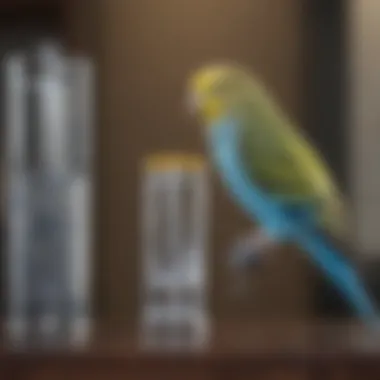
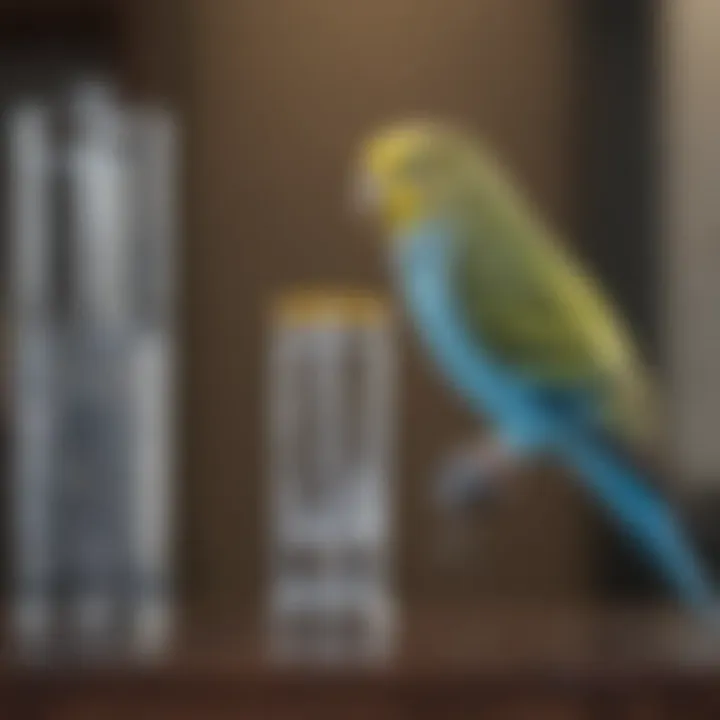
Variability in Water Quality
The quality of tap water varies significantly from one location to another. Factors such as the source of the water and local infrastructure affect this variability. Some key considerations include:
- Natural Water Sources: Places that source water from rivers and lakes may contain organic peroxide or bacteria depending on seasonal algae blooms.
- Regional Treating Methods: Cities may employ different purification techniques. Even within the same state, alcohol for water treatment can vary.
- Annual Water Quality Reports: Municipalities must publish reports annually, indicating which contaminants are present and in what quantities. Bird owners should read these reports to identify potential issues relevant to avian health.
Overall, regular assessment of tap water conditions in specific localities is important, particularly for those who keep multiple birds. By comprehending universal aspects and local peculiarities in water composition, bird owners can strategize effectively.
Awareness of water composition assists in providing a healthier drinking environment for your pet bird, ultimately influencing their overall wellbeing.
Health Risks Associated with Tap Water
Understanding the health risks associated with tap water is critical for ensuring the safety of pet birds. Unlike humans, birds have unique physiologies that may make them more susceptible to contaminants found in drinking water. Many substances may adversely affect their health. Therefore, it's vital to evaluate these risks comprehensively.
Contaminants of Concern
Various chemicals and substances can contaminate tap water, potentially harming pet birds. Below are some common contaminants that pose a risk:
- Chlorine: Many municipalities add chlorine to tap water for disinfection. However, birds are particularly sensitive to it. Exposure to high levels can cause respiratory irritation and other health issues.
- Heavy Metals: Contaminants such as lead and copper often leak into water supplies from old piping or plumbing fixtures. These metals can affect birds' nervous systems and can have long-lasting effects on their health.
- Pesticides: Runoff from agricultural areas may introduce pesticides into public water systems. These chemicals can be harmful to birds, leading to potential hormonal disruptions and other health issues.
- Bacteria and Parasites: Microbial contamination must also be taken into account. Inadequately treated tap water can harbor harmful bacteria and parasites, which poses a health risk to birds, particularly those with weakened immune systems.
Staying vigilant about these contaminants is a prompter for bird owners to ensure that the water offered to their pets is as safe as possible.
Implications for Pet Birds
The implications of these contaminants span both immediate and long-term health complications. Pet bird owners must be adept at recognizing these issues:
- Signs of Illness: Birds drinking contaminated water might show symptoms such as lethargy, feather plucking, or diarrhea. Timely identification remains essential.
- Long-Term Health: Continuous exposure to pollutants can lead to chronic conditions in birds. Lead poisoning, for example, may cause behavior changes or nerve disorders over time.
- Breeding and Lay Issues: Birds facing health challenges related to poor water quality could have difficulty breeding. Female birds may lay fewer or unhealthy eggs, affecting future generations.
Due to these risks, pet bird owners should consider alternatives to tap water. Reducing exposure is prudent. Focused efforts in monitoring water sources are essential when inadvertently harmful substances could easily go unnoticed. > Protecting your bird should be your priority. If you are in doubt, consult with an avian veterinarian to discuss water safety.
Assessing Local Tap Water Quality
To determine whether tap water is a safe option for pet birds, it is imperative to assess its overall quality. The quality of tap water varies depending on geographic locations, local regulations, and the infrastructure in place. By understanding these elements, bird owners can ensure the health and safety of their feathered companions, thereby making informed choices about their hydration.
Water Testing Kits
Water testing kits enable pet bird owners to measure varying water quality parameters such as pH, contaminants, and mineral content. These kits are easy to use and typically provide results within minutes. Common tests include those for chlorine, lead, nitrates, and heavy metals. Knowing how to utilize water testing kits effectively can save significant hassle in preventing potential health risks.
With a simple collection process, owners can
- Follow the instructions provided by the manufacturer.
- Use clean containers to obtain samples.
- Keep equipment away from contaminants before testing.
Frequent testing enables bird owners to monitor any changes in tap water quality over time. Additionally, understanding the specific parameters tested can help owners interpret results accurately.
Alternatives to Tap Water
When it comes to the water needs of pet birds, relying solely on tap water may not always be the best option. Asking whether pet birds can drink tap water requires an understanding of alternatives that might cater to their specific needs. The importance of exploring alternatives lies in safeguarding the health of these delicate creatures, minimizing exposure to potentially harmful elements present in tap water, and ensuring they receive optimal hydration.
Exploring filtered water options and bottled water considerations can lead to better dietary choices for pet birds. Both choices might come with advantages and caveats that need consideration. Ultimately, pet bird owners should weigh these factors to make informed choices for their companions.
Filtered Water Options
Filtered water is often seen as a top alternative to tap water for pet birds. The benefit of using water that has passed through a filtration system is that it can significantly reduce the presence of harmful substances. This includes chlorine, lead, and other contaminants which could impact a bird’s health over time.
Several types of filtration systems exist:
- Activated Carbon Filters: These are quite common and effective at reducing odor and chlorine in water. However, they may not remove heavy metals or certain pathogens.
- Reverse Osmosis Systems: This more advanced method purifies water by pushing it through a semipermeable membrane, successfully removing many contaminants, including metals and microbes.
- Ceramic Filters: Known for removing bacteria, these filters provide clean water without the use of power or chemicals.
Cost and maintenance are vital factors to keep in mind. A reverse osmosis system, while effective, may require more upfront investment and regular upkeep.
Bottled Water Considerations
Bottled water might seem like a simple solution, but it is not without its own issues. It is essential to scrutinize the source and quality of bottled water brands. Many bottled waters come from municipal sources albeit filtered. This may not alleviate the concerns related to contaminants completely.
Factors to consider with bottled water include:
- Source Certification: Ensure the source of the water is verified. Some well-known brands often advertise strict quality controls.
- Type of Packaging: Plastic bottles can leach chemicals into water, especially if exposed to heat or old. Opt for brands that use BPA-free materials if possible.
- Cost and Accessibility: Regularly purchasing bottled water can add up. Weight its convenience against long-term cost, especially for larger birds that require significant water supplies.
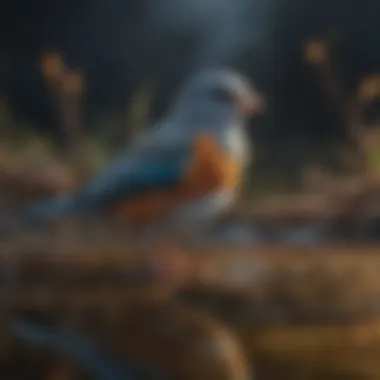
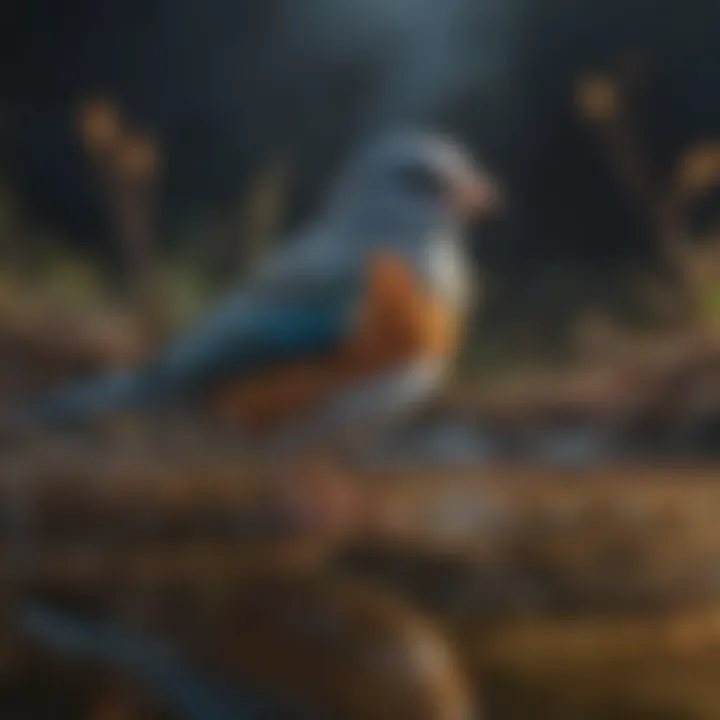
Creating a Safe Drinking Environment
Creating a safe drinking environment for your pet bird is more crucial than many avian owners realize. Birds, like all living creatures, depend on clean water for overall health and well-being. Contaminants in their drinking water can lead to health complications, making it essential that the proper strategy is used when ensuring their hydration needs are met. Regular attention and proper care are vital in establishing a routine that prioritizes the quality of the water they consume
Regular Maintenance of Water Bowls
Water bowls need regular cleaning to maintain hygiene and to prevent potential contamination. Birds are sensitive to changes in their environment, including the quality of the water they drink. Dirty areas can attract bacteria and mold, putting your bird at risk. Follow these suggestions for effective maintenance:
- Daily Check-Up: Examine the water quantity and its clarity daily. Replace it if it appears to be cloudy or dirty.
- Weekly Cleaning: Clean water bowls with warm, soapy water at least once a week to remove debris and residues. Rinse thoroughly afterward.
- Placement: Choose a location for the water bowl where it is protected from droppings and debris from the cage.
These small but harmfull actions will help create safe water environments putting less risk on health of your bird.
Signs of Water Contamination
Spotting signs of water contamination can be difficult, especially for first-time bird owner. Some issues could be subtle, but they can have significant implications for your pet's health. Observing your bird's drinking habits and the cleanliness of the water bowl may provide insights. Here are a few signs to monitor:
- Unusual Behavior: If your bird avoids drinking or appears lethargic, it could indicate poor water quality.
- Change in Color: Any discoloration of the water or visible anomalies should be a cause for concern.
- Algal Growth: The presence of green or brown algae denotes stagnation or higher levels of contaminants in the water and requires immediate action.
Keeping an eye on these signs helps detect problematic situations before they escalate. Regular maintenance, combined with vigilance in spotting problems, can significantly improve your feathered friend's quality of life.
Ensuring that birds have access to clean water is integral to their well-being, as they are highly susceptible to dehydration and infections.
Establish a secure and healthy drinking environment will do wonders for any pet bird. Understanding their unique needs and recognizing warning signs only serve to enhance this set up.
Differentiating Needs Based on Bird Size
Understanding the variability in hydration needs between smaller and larger species of pet birds is crucial for their health and well-being. Each bird size has its unique requirements for water intake, and failing to account for these differences may result in inadequate hydration or potential health issues.
Bird size directly affects not only the volume of water they need but also the way they utilize water. Small birds may have faster metabolism, demanding more frequent access to fresh water, while larger birds often require a larger water volume. Recognizing these distinctions allows bird owners to tailor their care practices to meet diverse needs. This ensures that each avian companion can thrive while staying hydrated.
Small Birds and Water Intake
Small birds, such as budgerigars or finches, tend to require a more frequent intake of water due to their high metabolic rate. They dehydrate more quickly than larger species during periods of heat or stress. Key points to consider include:
- Frequent Access: It is essential to allow small birds easy access to water throughout the day to prevent dehydration.
- Smaller Bowls: Using shallower sorting bowls may make it easier for these birds to drink without having to struggle.
- Water Frequency: Keeping a check on water levels in their bowls is important since small birds generally consume less at each drinking session but do so more often, particularly in warm conditions.
- Water Quality: While small birds can drink tap water, it is vital to monitor the condition of it, looking out for any signs of contamination or toxicity that could affect their health.
Large Birds and Hydration Needs
Larger birds, such as macaws or cockatoos, possess different hydration dynamics. They usually require a greater volume of water at a slower pace compared to small birds. Their water intake patterns involve the following:
- Wide Water Bowls: Due to their size, these birds benefit from larger, sturdier bowls that accommodate their beaks well. Having enough water is necessary for both drinking and bathing, which is essential for maintaining feather health.
- Slow Consumption: Large birds tend to drink in more significant amounts in fewer intervals. Monitoring water availability at all times is important, particularly if they are preening or bathing, subjects where hydration drastically aids in the process.
- Cooling Needs: In warm weather, large birds often take advantage of the water for cooling down by standing in or splashing about in their water bowls, indicating their need for ample water even during play.
- Health Monitoring: It's crucial to observe any behavioral changes that might occur when a large bird does not drink enough. Signs of dehydration should be taken seriously and addressed immediately, ideally with a consultation with an avian veterinarian.
Ensuring that pet birds have the appropriate water accessibility linked to their size prevents many potential health complications.
By differentiating hydration needs based on bird size, owners can take proactive measures to provide the best possible care for their pets. Tailoring hydration methods is not merely about quantity but also about enhancing quality, supporting overall health and well-being.
End: Making Informed Choices
Understanding the water needs of pet birds is critical for their health and wellbeing. This section emphasizes the need for informed decision-making regarding what type of water to offer our feathered companions. The analysis elaborated throughout this article makes it clear that each bird's needs vary according to species, size, and individual health. As such, comprehending the implications of using tap water versus alternative water choices becomes essential.
Key points include:
- The specific dietary and hydration needs unique to different bird species can heavily influenced their water consumption habits.
- Not all tap water is alike, and variability in local water quality can introduce risks and concerns that need consideration.
- Being aware of contaminants highlights the importance of ongoing education and has potential positive outcomes for bird health.
Moreover, staying attuned to the importance of water safety empowers bird owners. Taking steps to consult professionals and adapt practices ensures that we prioritize the health of our avian companions, ultimately leading to a more enjoyable and fulfilling relationship.
Consulting with Avian Veterinarians
Engaging with avian veterinarians is a prudent strategy for pet owners. These professionals possess specialized knowledge and can guide you about a range of topics crucial to the health of your bird. Veterinary consultations could go beyond simply addressing hydration needs, providing holistic care strategies tailored to individual birds.
In discussions with an avian vet, consider asking about:
- Recommendations for filtered versus tap water based on your breed.
- Recognition and evaluation of specific health concerns that may be linked to hydration.
- Any known local water quality issues prevalent in your area.
Understanding the nuances of your pet bird’s health ensures a proactive approach to their wellbeing.
Staying Informed on Water Safety
Maintaining an ongoing awareness about water safety is necessary. Given the changes in water systems and environments, what was acceptable yesterday may not be tomorrow. It is important to regularly update your knowledge concerning potential contaminants contained in tap water. Taking precautionary measures such as testing water samples and exploring community resources is beneficial.
Furthermore, consider these strategies for staying informed:
- Review annual water quality reports provided by your local water authority.
- Engage in discussions about water quality issues on community platforms like Reddit or local Facebook groups of bird owners.
- Follow articles and research focused on avian health which often address common drinking water dilemmas maximizing the health of your pet birds.















